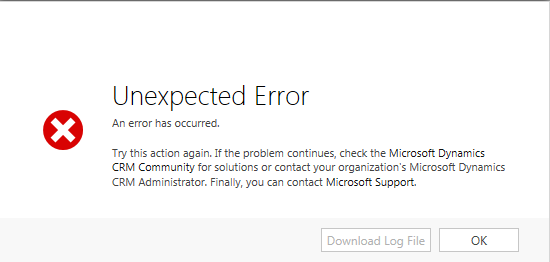Hi!
I am setting up a server-based SharePoint Integration on our DEV environment. I have followed the instructions on https://technet.microsoft.com/en-us/library/dn949332.aspx and everything seems to be in perfect order until I launch the "Enable Server-Based SharePoint Integration" wizard from CRM. After checking the "On-Premises" --> Next --> Providing the site URL (https://<FQDN>/sites/crmdev) and SharePoint realm ID --> Next..
Here it all comes to a screeching halt:


On the CRM server I get a 18176 error containing the following:
The Web Service plug-in failed in OrganizationId: 00e5d762-6caf-48e7-9331-4d96b31b7c84; SdkMessageProcessingStepId: e0bdf6d6-0b83-4aba-838f-f7b4a31afd72; EntityName: sharepointdocument; Stage: 30; MessageName: ValidateSharePointSite; AssemblyName: Microsoft.Crm.Extensibility.InternalOperationPlugin, Microsoft.Crm.ObjectModel, Version=8.0.0.0, Culture=neutral, PublicKeyToken=31bf3856ad364e35; ClassName: Microsoft.Crm.Extensibility.InternalOperationPlugin; Exception: Unhandled Exception: System.Reflection.TargetInvocationException: Exception has been thrown by the target of an invocation.
at System.RuntimeMethodHandle.InvokeMethod(Object target, Object[] arguments, Signature sig, Boolean constructor)
at System.Reflection.RuntimeMethodInfo.UnsafeInvokeInternal(Object obj, Object[] parameters, Object[] arguments)
at System.Reflection.RuntimeMethodInfo.Invoke(Object obj, BindingFlags invokeAttr, Binder binder, Object[] parameters, CultureInfo culture)
at System.Web.Services.Protocols.LogicalMethodInfo.Invoke(Object target, Object[] values)
at Microsoft.Crm.Extensibility.InternalOperationPlugin.Execute(IServiceProvider serviceProvider)
at Microsoft.Crm.Extensibility.V5PluginProxyStep.ExecuteInternal(PipelineExecutionContext context)
at Microsoft.Crm.Extensibility.VersionedPluginProxyStepBase.Execute(PipelineExecutionContext context)
Inner Exception: System.Xml.XmlException: An error occurred while parsing EntityName. Line 7, position 171.
at System.Xml.XmlTextReaderImpl.Throw(Exception e)
at System.Xml.XmlTextReaderImpl.HandleEntityReference(Boolean isInAttributeValue, EntityExpandType expandType, Int32& charRefEndPos)
at System.Xml.XmlTextReaderImpl.ParseText(Int32& startPos, Int32& endPos, Int32& outOrChars)
at System.Xml.XmlTextReaderImpl.FinishPartialValue()
at System.Xml.XmlTextReaderImpl.get_Value()
at System.Xml.Linq.XContainer.ReadContentFrom(XmlReader r)
at System.Xml.Linq.XContainer.ReadContentFrom(XmlReader r, LoadOptions o)
at System.Xml.Linq.XElement.ReadElementFrom(XmlReader r, LoadOptions o)
at System.Xml.Linq.XElement.Load(XmlReader reader, LoadOptions options)
at System.Xml.Linq.XElement.Parse(String text, LoadOptions options)
at Microsoft.Crm.ObjectModel.SharePointProxyBase.ValidateSharePointSite(String[] siteUrls, String& validationLog)
at Microsoft.Crm.ObjectModel.SharePointProxyService.ValidateSharePointSite(String[] siteUrls, ExecutionContext context, String& validationLog)
.
There is also a windows error reporting event, containing the following log info:
Exception generated at: 18.11.2016 08:44:20
Error Type: System.Xml.XmlException
Error Message: An error occurred while parsing EntityName. Line 7, position 171.
Error Stack Trace:
at XmlTextReaderImpl.Throw(Exception e) ilOffset = 0x27
at XmlTextReaderImpl.HandleEntityReference(Boolean isInAttributeValue, EntityExpandType expandType, Int32& charRefEndPos) ilOffset = 0xB5
at XmlTextReaderImpl.ParseText(Int32& startPos, Int32& endPos, Int32& outOrChars) ilOffset = 0x1D0
at XmlTextReaderImpl.FinishPartialValue() ilOffset = 0x36
at XmlTextReaderImpl.get_Value() ilOffset = 0x1A
at XContainer.ReadContentFrom(XmlReader r) ilOffset = 0x132
at XContainer.ReadContentFrom(XmlReader r, LoadOptions o) ilOffset = 0x354
at XElement.ReadElementFrom(XmlReader r, LoadOptions o) ilOffset = 0x106
at XElement.Load(XmlReader reader, LoadOptions options) ilOffset = 0x4C
at XElement.Parse(String text, LoadOptions options) ilOffset = 0x16
at SharePointProxyBase.ValidateSharePointSite(String[] siteUrls, String& validationLog) ilOffset = 0x6E2
at SharePointProxyService.ValidateSharePointSite(String[] siteUrls, ExecutionContext context, String& validationLog) ilOffset = 0xF5
Stack Frame:
at Pipeline.Execute(PipelineExecutionContext context) ilOffset = 0xDD
at MessageProcessor.Execute(PipelineExecutionContext context) ilOffset = 0x1EB
at InternalMessageDispatcher.Execute(PipelineExecutionContext context) ilOffset = 0xE4
at ExternalMessageDispatcher.ExecuteInternal(IInProcessOrganizationServiceFactory serviceFactory, IPlatformMessageDispatcherFactory dispatcherFactory, String messageName, String requestName, Int32 primaryObjectTypeCode, Int32 secondaryObjectTypeCode, ParameterCollection fields, CorrelationToken correlationToken, CallerOriginToken originToken, UserAuth userAuth, Guid callerId, Guid callerRegardingObjectId, UserType userType, Guid transactionContextId, Int32 invocationSource, Nullable`1 requestId, Version endpointVersion) ilOffset = 0x22D
at ExternalMessageDispatcher.Execute(IInProcessOrganizationServiceFactory serviceFactory, IPlatformMessageDispatcherFactory dispatcherFactory, String messageName, String requestName, Int32 primaryObjectTypeCode, Int32 secondaryObjectTypeCode, ParameterCollection fields, CorrelationToken correlationToken, CallerOriginToken originToken, UserAuth userAuth, Guid callerId, Guid callerRegardingObjectId, UserType userType, Guid transactionContextId, Int32 invocationSource, Nullable`1 requestId) ilOffset = 0x0
at OrganizationSdkServiceInternal.ExecuteRequestRequestWithInstrumentation(OrganizationRequest request, CorrelationToken correlationToken, CallerOriginToken callerOriginToken, WebServiceType serviceType, UserAuth userAuth, Guid targetUserId, OrganizationContext context, Boolean returnResponse, Boolean checkAdminMode, Object operation, UserType targetUserType) ilOffset = 0x0
at OrganizationSdkServiceInternal.ExecuteRequest(OrganizationRequest request, CorrelationToken correlationToken, CallerOriginToken callerOriginToken, WebServiceType serviceType, Boolean checkAdminMode, ExecutionContext executionContext) ilOffset = 0x4B
at OrganizationSdkServiceInternal.Execute(OrganizationRequest request, CorrelationToken correlationToken, CallerOriginToken callerOriginToken, WebServiceType serviceType, Boolean checkAdminMode, ExecutionContext executionContext) ilOffset = 0x0
at InprocessServiceProxy.ExecuteCore(OrganizationRequest request) ilOffset = 0x34
at SandboxSdkListener.ExecuteInternal(SandboxCallInfo callInfo, SandboxSdkContext requestContext, String operation, Byte[] serializedRequest, IExecutionContext context, String& primaryEntityName) ilOffset = 0xDA
at SandboxSdkListener.Execute(SandboxCallInfo callInfo, SandboxSdkContext requestContext, String operation, Byte[] serializedRequest) ilOffset = 0xC3
at ilOffset = 0xFFFFFFFF
at SyncMethodInvoker.Invoke(Object instance, Object[] inputs, Object[]& outputs) ilOffset = 0x222
at DispatchOperationRuntime.InvokeBegin(MessageRpc& rpc) ilOffset = 0x97
at ImmutableDispatchRuntime.ProcessMessage5(MessageRpc& rpc) ilOffset = 0x48
at MessageRpc.Process(Boolean isOperationContextSet) ilOffset = 0x65
at Wrapper.Resume(Boolean& alreadyResumedNoLock) ilOffset = 0x1B
at ThreadBehavior.ResumeProcessing(IResumeMessageRpc resume) ilOffset = 0x8
at ExecutionContext.RunInternal(ExecutionContext executionContext, ContextCallback callback, Object state, Boolean preserveSyncCtx) ilOffset = 0x79
at ExecutionContext.Run(ExecutionContext executionContext, ContextCallback callback, Object state, Boolean preserveSyncCtx) ilOffset = 0x9
at QueueUserWorkItemCallback.System.Threading.IThreadPoolWorkItem.ExecuteWorkItem() ilOffset = 0x35
at ThreadPoolWorkQueue.Dispatch() ilOffset = 0xA4
Exception Data:
1: Key type: System.String, value: PluginTrace
Custom Message: Web Service Plug-in failed in SdkMessageProcessingStepId: e0bdf6d6-0b83-4aba-838f-f7b4a31afd72; EntityName: sharepointdocument; Stage: 30; MessageName: ValidateSharePointSite; AssemblyName: Microsoft.Crm.Extensibility.InternalOperationPlugin, Microsoft.Crm.ObjectModel, Version=8.0.0.0, Culture=neutral, PublicKeyToken=31bf3856ad364e35; ClassName: Microsoft.Crm.Extensibility.InternalOperationPlugin; Exception: Unhandled Exception: System.Reflection.TargetInvocationException: Exception has been thrown by the target of an invocation.
at System.RuntimeMethodHandle.InvokeMethod(Object target, Object[] arguments, Signature sig, Boolean constructor)
at System.Reflection.RuntimeMethodInfo.UnsafeInvokeInternal(Object obj, Object[] parameters, Object[] arguments)
at System.Reflection.RuntimeMethodInfo.Invoke(Object obj, BindingFlags invokeAttr, Binder binder, Object[] parameters, CultureInfo culture)
at System.Web.Services.Protocols.LogicalMethodInfo.Invoke(Object target, Object[] values)
at Microsoft.Crm.Extensibility.InternalOperationPlugin.Execute(IServiceProvider serviceProvider)
at Microsoft.Crm.Extensibility.V5PluginProxyStep.ExecuteInternal(PipelineExecutionContext context)
at Microsoft.Crm.Extensibility.VersionedPluginProxyStepBase.Execute(PipelineExecutionContext context)
Inner Exception: System.Xml.XmlException: An error occurred while parsing EntityName. Line 7, position 171.
at System.Xml.XmlTextReaderImpl.Throw(Exception e)
at System.Xml.XmlTextReaderImpl.HandleEntityReference(Boolean isInAttributeValue, EntityExpandType expandType, Int32& charRefEndPos)
at System.Xml.XmlTextReaderImpl.ParseText(Int32& startPos, Int32& endPos, Int32& outOrChars)
at System.Xml.XmlTextReaderImpl.FinishPartialValue()
at System.Xml.XmlTextReaderImpl.get_Value()
at System.Xml.Linq.XContainer.ReadContentFrom(XmlReader r)
at System.Xml.Linq.XContainer.ReadContentFrom(XmlReader r, LoadOptions o)
at System.Xml.Linq.XElement.ReadElementFrom(XmlReader r, LoadOptions o)
at System.Xml.Linq.XElement.Load(XmlReader reader, LoadOptions options)
at System.Xml.Linq.XElement.Parse(String text, LoadOptions options)
at Microsoft.Crm.ObjectModel.SharePointProxyBase.ValidateSharePointSite(String[] siteUrls, String& validationLog)
at Microsoft.Crm.ObjectModel.SharePointProxyService.ValidateSharePointSite(String[] siteUrls, ExecutionContext context, String& validationLog)
.
My user is CRM Administrator, local admin on both CRM and Sharepoint servers, and SharePoint Farm Administrator. Certificates are issues by our local CA.
I can't get a grasp of exactly WHAT is failing, and where to start looking. If I manually add a SharePoint site in CRM, and run validation it validates. However it will not validate through the SBI wizard..
Any takers? :)



